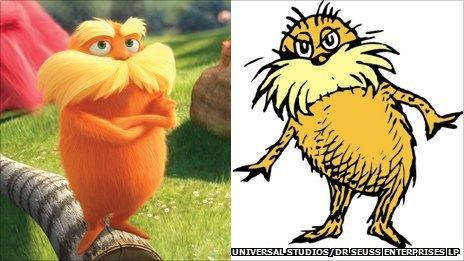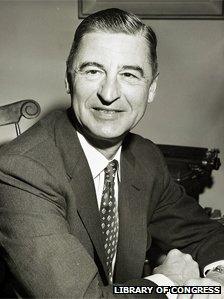Five interpretations of The Lorax
- Published

Seuss's original Lorax (right) is much sparser than the Universal Studios one
It's more than 40 years since Dr Seuss first published The Lorax, his classic tale of needless consumerism and environmental ruin. But as a new film version is released in the US, what is the book really all about?
As schoolchildren across the world can attest, The Lorax is the story of an ambitious businessman, a Once-ler, who reaps an entire forest of Truffula Trees to render their soft tufts into luxurious thneeds.
The Lorax, who speaks for the trees, warns of the dire consequences of such environmental mismanagement - but his message goes unheeded until it's too late.
On Friday, the same day the book's author would have turned 108, the orange, moustachioed environmental activist know as the Lorax made his big-screen debut in a 3D animated film by Universal Studios.
It's been a long and circuitous road for the book, which like most of Seuss's books, found its origin in his personal experience.
But just what is the Lorax about? Over the past 40 years, the book has meant different things at different times.
1. An environmental warning
The Lorax was published in 1971, just as the environmental movement began to take hold (the first Earth Day was held in New York the year before).
It is set in a dark, murky post-apocalyptic landscape, destroyed by the Once-ler's exploitation of the natural world. The consequence of excessive industrialisation is clear. But it ends with a glimmer of hope, as a single Truffula seed is left behind.
The book went on to sell more than 200 million copies, and is widely used as a teaching aid for children's classes on environmentalism. Several university groups devoted to conservation have named themselves "The Lorax".
Though most of the Seuss archives are housed at the University of California, San Diego, the Lorax drawings are found in Austin, at the presidential library of Lyndon B Johnson.
Johnson, president from 1963 to 1969, and his wife were staunch environmentalists. She was known for her highway beautification projects; he protected nine million acres of federal land.
When he heard that the book was under way, he called Seuss - unprompted - to thank him in advance for donating the original artwork to the Johnson archive.
2. A critique of capitalism
Seuss isn't only concerned with the environment.
He also implies the Once-ler relies on an aggressive, saturating advertising campaign to promote the thneeds, shapeless garments of dubious utility.
"The Lorax was a brilliant description of capitalism as we know it," says Peter Barnes, a San Francisco businessman and author of Capitalism 3.0.
"If you look at all the advertising, all the crap that our economy churns out, most of it is thneeds, it's not stuff we actually need. It's stuff we're made to think we need."
Barnes says that while Seuss doesn't prescribe a remedy, his warning in The Lorax is clear.
"Implicit there, is that unless we do something about that, there ain't going to be any trees, birds or fish left."
3. A personal crusade

Dr Seuss drew on his experiences
Seuss's studio in San Diego overlooked the Pacific and the view was framed by beautiful eucalyptus trees, says Steve Brezzo, a friend, neighbour and former art world colleague.
When developers sought permission to fell them to build residential property, Seuss launched a campaign in opposition.
"In his typical Seussian fashion, he began to develop this whole fantastic scenario about saving the trees," says Mr Brezzo.
Seuss won, and the trees were preserved.
The same cannot be said for the Lorax, who failed to overcome corporate greed. "Business is business! And business must grow, regardless of crummies in tummies, you know."
4. Propaganda
Pro-business groups, including loggers, attacked it as environmental propaganda and the book was even banned in some schools and libraries.
Universal Studios has released a trailer for the Lorax big screen debut
Recently, Fox Business host Lou Dobbs warned that the film adaptation of The Lorax was indoctrinating children against big industry.
He said it was "demonising the 1% and espousing the virtue of green energy policy".
The logging industry responded with its own book, The Truax, about responsible forest management.
5. Marketing for SUVs
Universal Studios, which produced the new Lorax movie, has created marketing tie-ins with dozens of green products, according to the Associated Press, with the Lorax hawking everything from eco-friendly vacations to fuel-efficient SUVs.
At a school in Virginia recently, more than 100 school children sat through a reading of The Lorax, followed by a presentation from a Mazda marketing executive who urged the children to persuade their parents to test-drive a Mazda SUV, the Washington Post reported, external.
Seuss would most likely have been uncomfortable with the fact that his character is being used directly to market products to children, says Mr Brezzo.
"He wanted to see a child with a book, reacting page by page, spontaneously to the drawings," he says. "He wasn't interested in that big cereal box world."
"When the character that's being used to sell those products is one that's essentially been a spokesperson for conservation for more than 40 years, it's particularly perverse and damaging," says Mr Brezzo.